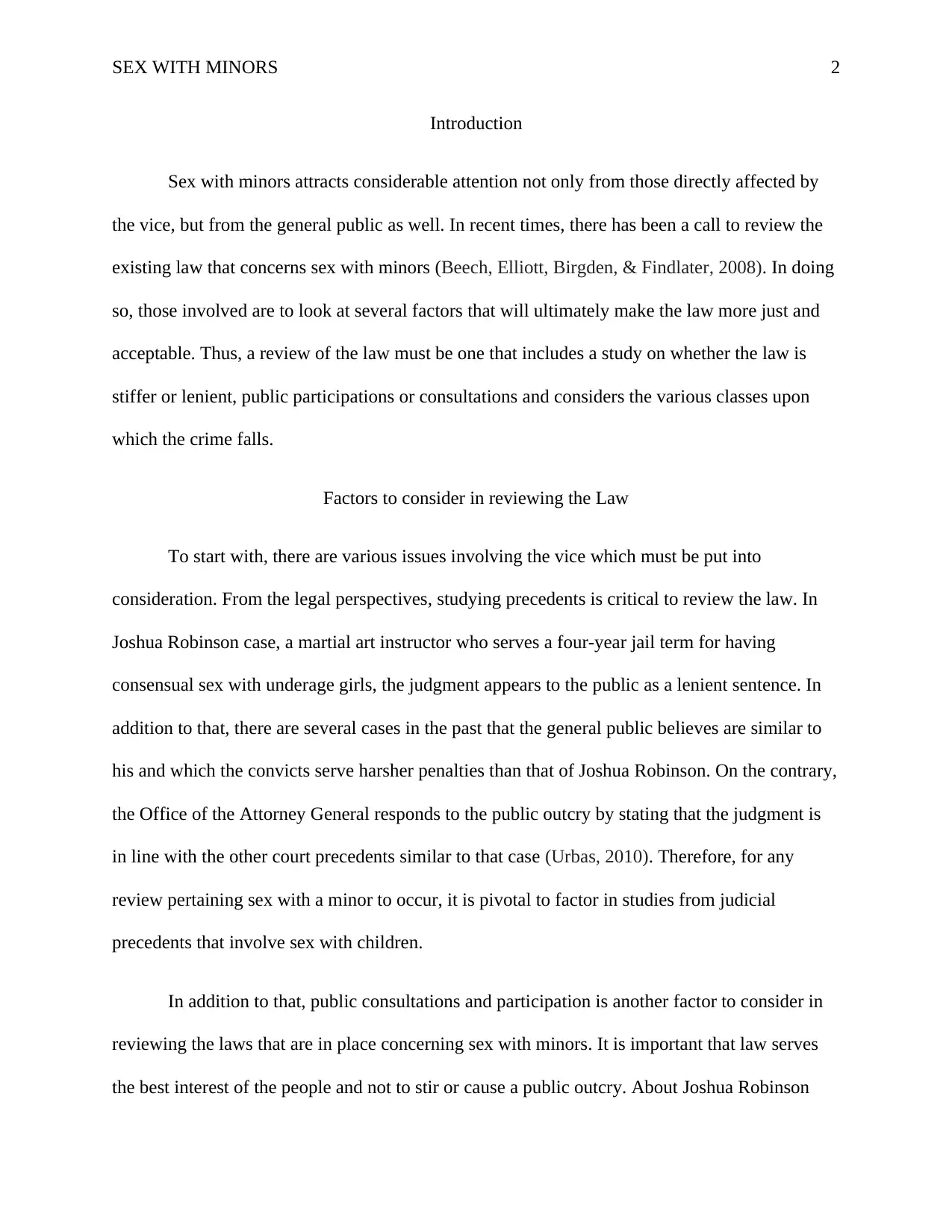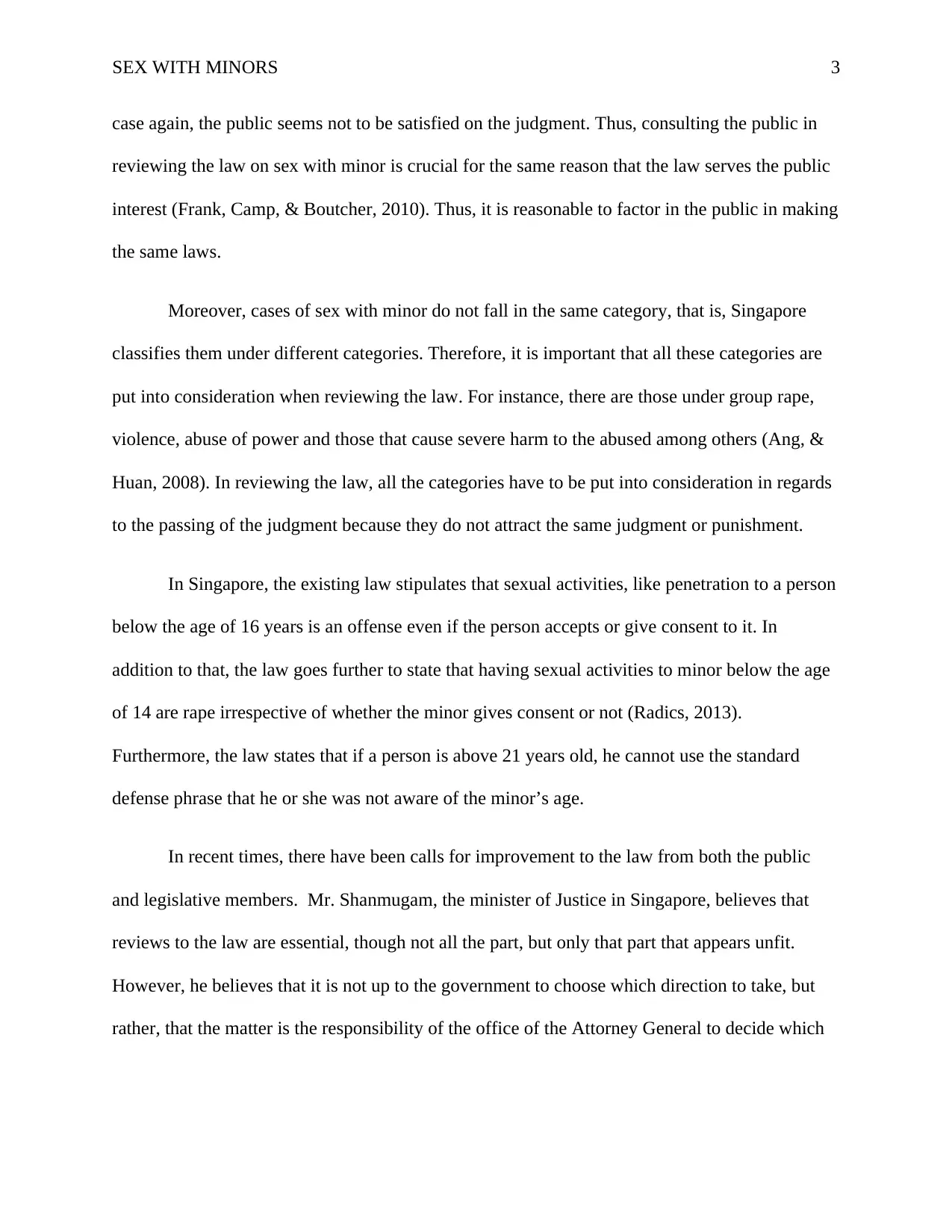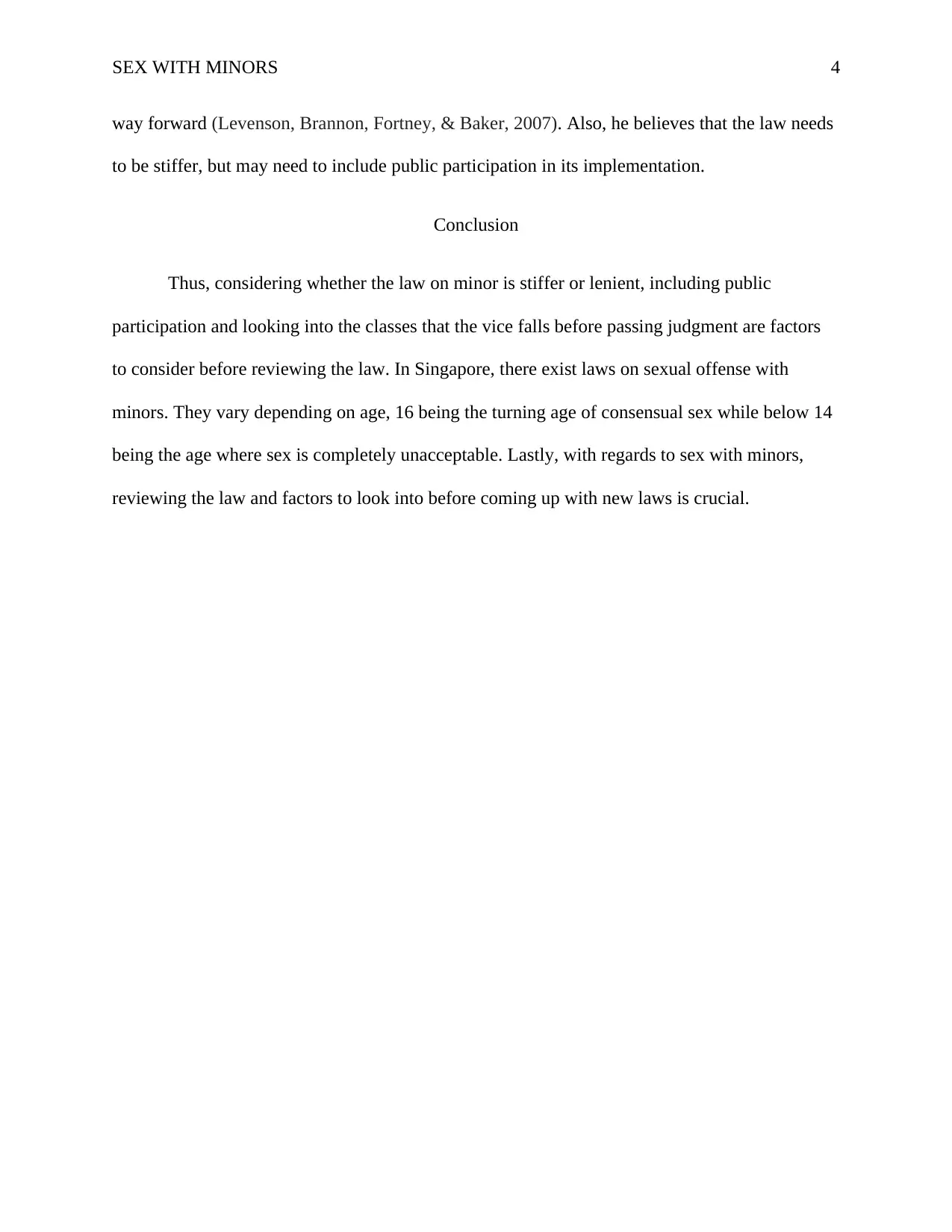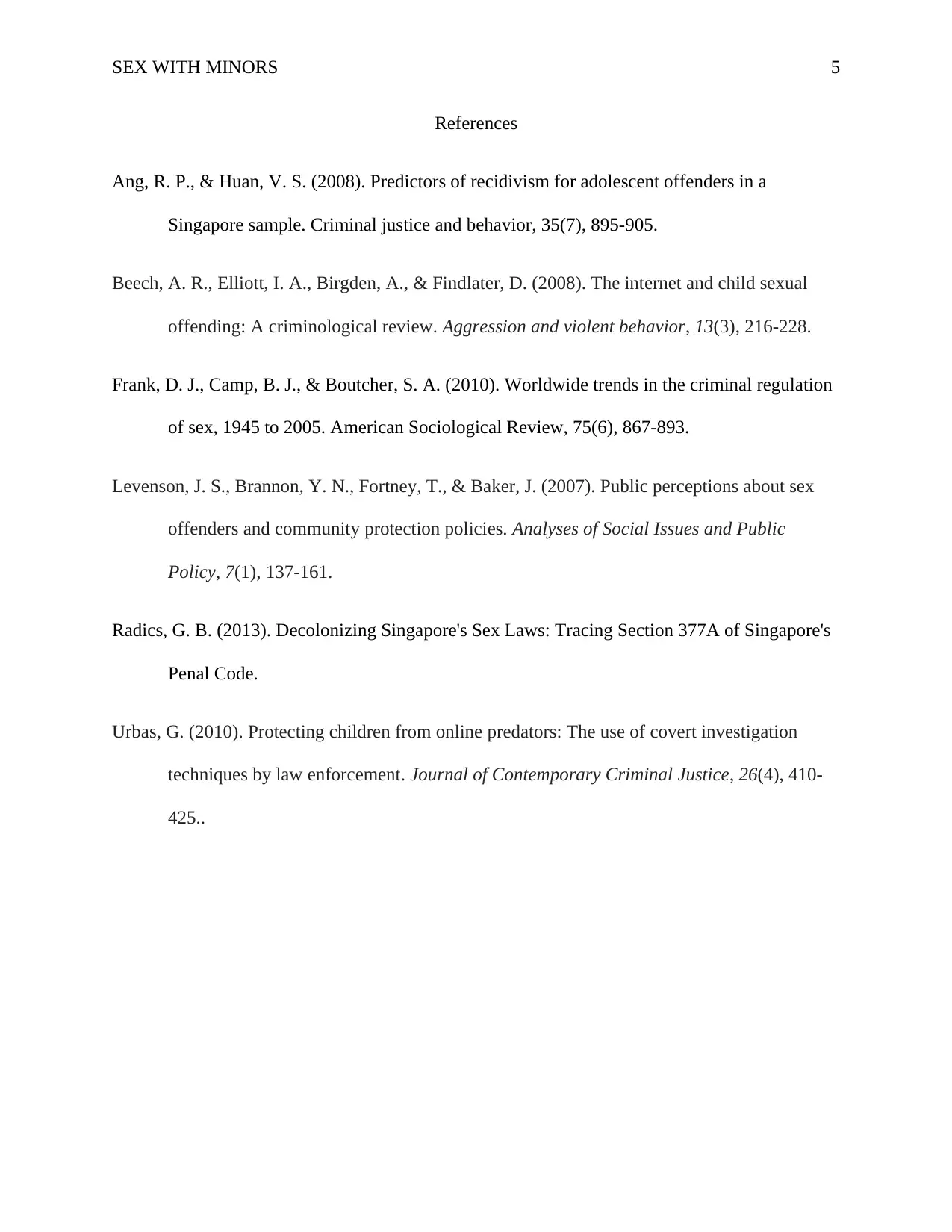Analysis of Legal Precedents and Public Opinion: Sex with Minors Laws
VerifiedAdded on 2020/03/04
|5
|1121
|327
Essay
AI Summary
This essay provides a comprehensive analysis of the laws concerning sex with minors, focusing on the legal and social complexities surrounding this issue. It examines the factors that should be considered when reviewing these laws, including judicial precedents, public opinion, and the various classifications of offenses. The essay uses the Singapore legal framework as a case study, highlighting the existing laws on sexual offenses with minors and the different categories under which these offenses fall. It also discusses the calls for improvement to the law from both the public and legislative members, including the need for stiffer penalties and public participation. The essay concludes by emphasizing the importance of considering these factors before reviewing and reforming laws related to sex with minors, ensuring that the legal framework is just and acceptable.

Running head: SEX WITH MINORS 1
Sex with Minors
Institution’s Name
Date
Sex with Minors
Institution’s Name
Date
Paraphrase This Document
Need a fresh take? Get an instant paraphrase of this document with our AI Paraphraser

SEX WITH MINORS 2
Introduction
Sex with minors attracts considerable attention not only from those directly affected by
the vice, but from the general public as well. In recent times, there has been a call to review the
existing law that concerns sex with minors (Beech, Elliott, Birgden, & Findlater, 2008). In doing
so, those involved are to look at several factors that will ultimately make the law more just and
acceptable. Thus, a review of the law must be one that includes a study on whether the law is
stiffer or lenient, public participations or consultations and considers the various classes upon
which the crime falls.
Factors to consider in reviewing the Law
To start with, there are various issues involving the vice which must be put into
consideration. From the legal perspectives, studying precedents is critical to review the law. In
Joshua Robinson case, a martial art instructor who serves a four-year jail term for having
consensual sex with underage girls, the judgment appears to the public as a lenient sentence. In
addition to that, there are several cases in the past that the general public believes are similar to
his and which the convicts serve harsher penalties than that of Joshua Robinson. On the contrary,
the Office of the Attorney General responds to the public outcry by stating that the judgment is
in line with the other court precedents similar to that case (Urbas, 2010). Therefore, for any
review pertaining sex with a minor to occur, it is pivotal to factor in studies from judicial
precedents that involve sex with children.
In addition to that, public consultations and participation is another factor to consider in
reviewing the laws that are in place concerning sex with minors. It is important that law serves
the best interest of the people and not to stir or cause a public outcry. About Joshua Robinson
Introduction
Sex with minors attracts considerable attention not only from those directly affected by
the vice, but from the general public as well. In recent times, there has been a call to review the
existing law that concerns sex with minors (Beech, Elliott, Birgden, & Findlater, 2008). In doing
so, those involved are to look at several factors that will ultimately make the law more just and
acceptable. Thus, a review of the law must be one that includes a study on whether the law is
stiffer or lenient, public participations or consultations and considers the various classes upon
which the crime falls.
Factors to consider in reviewing the Law
To start with, there are various issues involving the vice which must be put into
consideration. From the legal perspectives, studying precedents is critical to review the law. In
Joshua Robinson case, a martial art instructor who serves a four-year jail term for having
consensual sex with underage girls, the judgment appears to the public as a lenient sentence. In
addition to that, there are several cases in the past that the general public believes are similar to
his and which the convicts serve harsher penalties than that of Joshua Robinson. On the contrary,
the Office of the Attorney General responds to the public outcry by stating that the judgment is
in line with the other court precedents similar to that case (Urbas, 2010). Therefore, for any
review pertaining sex with a minor to occur, it is pivotal to factor in studies from judicial
precedents that involve sex with children.
In addition to that, public consultations and participation is another factor to consider in
reviewing the laws that are in place concerning sex with minors. It is important that law serves
the best interest of the people and not to stir or cause a public outcry. About Joshua Robinson

SEX WITH MINORS 3
case again, the public seems not to be satisfied on the judgment. Thus, consulting the public in
reviewing the law on sex with minor is crucial for the same reason that the law serves the public
interest (Frank, Camp, & Boutcher, 2010). Thus, it is reasonable to factor in the public in making
the same laws.
Moreover, cases of sex with minor do not fall in the same category, that is, Singapore
classifies them under different categories. Therefore, it is important that all these categories are
put into consideration when reviewing the law. For instance, there are those under group rape,
violence, abuse of power and those that cause severe harm to the abused among others (Ang, &
Huan, 2008). In reviewing the law, all the categories have to be put into consideration in regards
to the passing of the judgment because they do not attract the same judgment or punishment.
In Singapore, the existing law stipulates that sexual activities, like penetration to a person
below the age of 16 years is an offense even if the person accepts or give consent to it. In
addition to that, the law goes further to state that having sexual activities to minor below the age
of 14 are rape irrespective of whether the minor gives consent or not (Radics, 2013).
Furthermore, the law states that if a person is above 21 years old, he cannot use the standard
defense phrase that he or she was not aware of the minor’s age.
In recent times, there have been calls for improvement to the law from both the public
and legislative members. Mr. Shanmugam, the minister of Justice in Singapore, believes that
reviews to the law are essential, though not all the part, but only that part that appears unfit.
However, he believes that it is not up to the government to choose which direction to take, but
rather, that the matter is the responsibility of the office of the Attorney General to decide which
case again, the public seems not to be satisfied on the judgment. Thus, consulting the public in
reviewing the law on sex with minor is crucial for the same reason that the law serves the public
interest (Frank, Camp, & Boutcher, 2010). Thus, it is reasonable to factor in the public in making
the same laws.
Moreover, cases of sex with minor do not fall in the same category, that is, Singapore
classifies them under different categories. Therefore, it is important that all these categories are
put into consideration when reviewing the law. For instance, there are those under group rape,
violence, abuse of power and those that cause severe harm to the abused among others (Ang, &
Huan, 2008). In reviewing the law, all the categories have to be put into consideration in regards
to the passing of the judgment because they do not attract the same judgment or punishment.
In Singapore, the existing law stipulates that sexual activities, like penetration to a person
below the age of 16 years is an offense even if the person accepts or give consent to it. In
addition to that, the law goes further to state that having sexual activities to minor below the age
of 14 are rape irrespective of whether the minor gives consent or not (Radics, 2013).
Furthermore, the law states that if a person is above 21 years old, he cannot use the standard
defense phrase that he or she was not aware of the minor’s age.
In recent times, there have been calls for improvement to the law from both the public
and legislative members. Mr. Shanmugam, the minister of Justice in Singapore, believes that
reviews to the law are essential, though not all the part, but only that part that appears unfit.
However, he believes that it is not up to the government to choose which direction to take, but
rather, that the matter is the responsibility of the office of the Attorney General to decide which
⊘ This is a preview!⊘
Do you want full access?
Subscribe today to unlock all pages.

Trusted by 1+ million students worldwide

SEX WITH MINORS 4
way forward (Levenson, Brannon, Fortney, & Baker, 2007). Also, he believes that the law needs
to be stiffer, but may need to include public participation in its implementation.
Conclusion
Thus, considering whether the law on minor is stiffer or lenient, including public
participation and looking into the classes that the vice falls before passing judgment are factors
to consider before reviewing the law. In Singapore, there exist laws on sexual offense with
minors. They vary depending on age, 16 being the turning age of consensual sex while below 14
being the age where sex is completely unacceptable. Lastly, with regards to sex with minors,
reviewing the law and factors to look into before coming up with new laws is crucial.
way forward (Levenson, Brannon, Fortney, & Baker, 2007). Also, he believes that the law needs
to be stiffer, but may need to include public participation in its implementation.
Conclusion
Thus, considering whether the law on minor is stiffer or lenient, including public
participation and looking into the classes that the vice falls before passing judgment are factors
to consider before reviewing the law. In Singapore, there exist laws on sexual offense with
minors. They vary depending on age, 16 being the turning age of consensual sex while below 14
being the age where sex is completely unacceptable. Lastly, with regards to sex with minors,
reviewing the law and factors to look into before coming up with new laws is crucial.
Paraphrase This Document
Need a fresh take? Get an instant paraphrase of this document with our AI Paraphraser

SEX WITH MINORS 5
References
Ang, R. P., & Huan, V. S. (2008). Predictors of recidivism for adolescent offenders in a
Singapore sample. Criminal justice and behavior, 35(7), 895-905.
Beech, A. R., Elliott, I. A., Birgden, A., & Findlater, D. (2008). The internet and child sexual
offending: A criminological review. Aggression and violent behavior, 13(3), 216-228.
Frank, D. J., Camp, B. J., & Boutcher, S. A. (2010). Worldwide trends in the criminal regulation
of sex, 1945 to 2005. American Sociological Review, 75(6), 867-893.
Levenson, J. S., Brannon, Y. N., Fortney, T., & Baker, J. (2007). Public perceptions about sex
offenders and community protection policies. Analyses of Social Issues and Public
Policy, 7(1), 137-161.
Radics, G. B. (2013). Decolonizing Singapore's Sex Laws: Tracing Section 377A of Singapore's
Penal Code.
Urbas, G. (2010). Protecting children from online predators: The use of covert investigation
techniques by law enforcement. Journal of Contemporary Criminal Justice, 26(4), 410-
425..
References
Ang, R. P., & Huan, V. S. (2008). Predictors of recidivism for adolescent offenders in a
Singapore sample. Criminal justice and behavior, 35(7), 895-905.
Beech, A. R., Elliott, I. A., Birgden, A., & Findlater, D. (2008). The internet and child sexual
offending: A criminological review. Aggression and violent behavior, 13(3), 216-228.
Frank, D. J., Camp, B. J., & Boutcher, S. A. (2010). Worldwide trends in the criminal regulation
of sex, 1945 to 2005. American Sociological Review, 75(6), 867-893.
Levenson, J. S., Brannon, Y. N., Fortney, T., & Baker, J. (2007). Public perceptions about sex
offenders and community protection policies. Analyses of Social Issues and Public
Policy, 7(1), 137-161.
Radics, G. B. (2013). Decolonizing Singapore's Sex Laws: Tracing Section 377A of Singapore's
Penal Code.
Urbas, G. (2010). Protecting children from online predators: The use of covert investigation
techniques by law enforcement. Journal of Contemporary Criminal Justice, 26(4), 410-
425..
1 out of 5
Your All-in-One AI-Powered Toolkit for Academic Success.
+13062052269
info@desklib.com
Available 24*7 on WhatsApp / Email
![[object Object]](/_next/static/media/star-bottom.7253800d.svg)
Unlock your academic potential
Copyright © 2020–2026 A2Z Services. All Rights Reserved. Developed and managed by ZUCOL.
